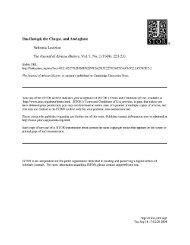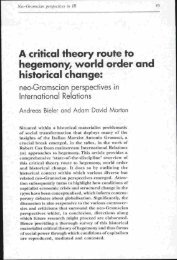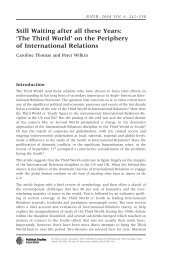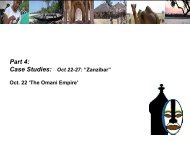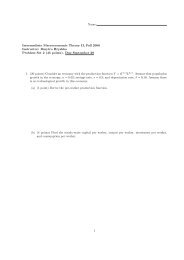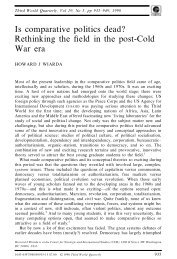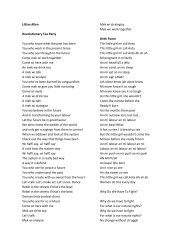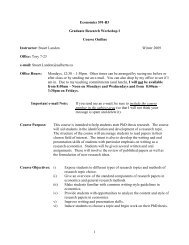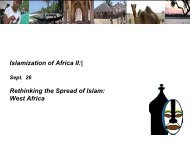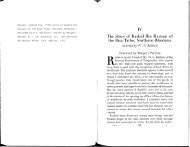personal memories revolutionary states and indian ocean migrations
personal memories revolutionary states and indian ocean migrations
personal memories revolutionary states and indian ocean migrations
Create successful ePaper yourself
Turn your PDF publications into a flip-book with our unique Google optimized e-Paper software.
The rest of the argument will have to be<br />
judged on its own merits. Even though<br />
it is not possible for me to defend<br />
William Kristol’s position on any<br />
political issue of the day, opponents of<br />
neo-conservatism will find little to<br />
applaud in the attack set forth in this<br />
chapter.<br />
Chapter Eleven is quite<br />
interesting <strong>and</strong> certainly very timely.<br />
Anne Norton focuses on the William<br />
Kristol <strong>and</strong> Robert Kagan edited<br />
volume, Present Dangers to argue that the<br />
neo-conservatives are taking the US on<br />
a new imperial route – one that runs<br />
counter to the route Straussians<br />
previously preferred, given their former<br />
reading of Thucydides. The argument is<br />
clever, but incorrectly makes neoconservatives<br />
into Straussians. Norton<br />
also criticizes Wohlstetter harshly for<br />
traveling too much <strong>and</strong> trying to teach<br />
without adequate preparation. To be<br />
sure that the charges stick, she repeats<br />
them almost word for word. But what<br />
does that have to do with the larger<br />
argument? Similarly, when she casts her<br />
net wider, Norton commits a mighty<br />
anachronism: Joseph Cropsey, Herbert<br />
J. Storing, <strong>and</strong> Nathan Tarcov were not<br />
all together at the University of Chicago<br />
when Wolfowitz was beginning his<br />
political career (p. 183). Indeed, Storing<br />
was dead before Tarcov ever came to<br />
Chicago.<br />
Those interested in the Arab<br />
<strong>and</strong> Muslim Middle East will do well to<br />
read the last two chapters of Norton’s<br />
book attentively. In Chapter Twelve,<br />
she focuses mainly on the way<br />
Straussians, not-named except for<br />
Carnes Lord, recast ideas today so that<br />
Muslims are the hated people <strong>and</strong> thus<br />
fall prey to a new kind of anti-Semitism.<br />
She notes, correctly, that this was not<br />
the way Strauss understood such matters<br />
<strong>and</strong> speaks about his essay on Hermann<br />
Cohen. But that essay does not address<br />
the issue. Unfortunately, those<br />
Straussians like David Schaeffer who<br />
have taken upon themselves the task of<br />
refuting Norton (see Interpretation 32/3,<br />
http://web.mit.edu/cis/www/mitejmes/<br />
83<br />
Summer 2005, 283-306) richly confirm<br />
her charge. Chapter Thirteen could<br />
have served as a marvelous tribute to<br />
what Leo Strauss sought to do with his<br />
own studies of medieval Arabic <strong>and</strong><br />
Islamic political philosophy <strong>and</strong> how he<br />
sought to promote it, but she gets<br />
simple facts terribly confused. Yusuf<br />
Chahine’s film, Destiny, is not about<br />
Avicenna (p. 223), but Averroes. The<br />
Lerner-Mahdi Sourcebook on Medieval<br />
Political Philosophy does not contain<br />
anything on Alghazali, nor did I write<br />
anything in it (p. 225).<br />
These last points are surely<br />
most telling. Above all, no one remotely<br />
acquainted with the medieval Arabic <strong>and</strong><br />
Islamic tradition would group Alghazali<br />
among the philosophers. No one who<br />
had looked carefully at the Lerner-<br />
Mahdi Sourcebook would claim they had<br />
included Alghazali in it, <strong>and</strong> anyone<br />
wanting to write about it must look<br />
carefully at it – as at any other writing<br />
described or cited. Such a false<br />
attribution shows how little attention<br />
Norton pays to detail <strong>and</strong> how much<br />
she relies on vague impressions.<br />
Sympathetic as a reader like myself –<br />
who considers himself a Straussian – is<br />
with an attempt to show how others<br />
who consider themselves Straussians<br />
have allowed their political opinions to<br />
carry them far afield from our common<br />
interest in political philosophy <strong>and</strong> in<br />
the perennial questions to which we<br />
seek answers by its pursuit, Anne<br />
Norton’s purported exposé is ultimately<br />
less than persuasive. In sum, this final<br />
instance of careless attribution is on a<br />
par with her opening reliance on an<br />
anecdote from one of Strauss’s sworn<br />
enemies to attempt to belittle a man of<br />
inestimable intellectual greatness.



